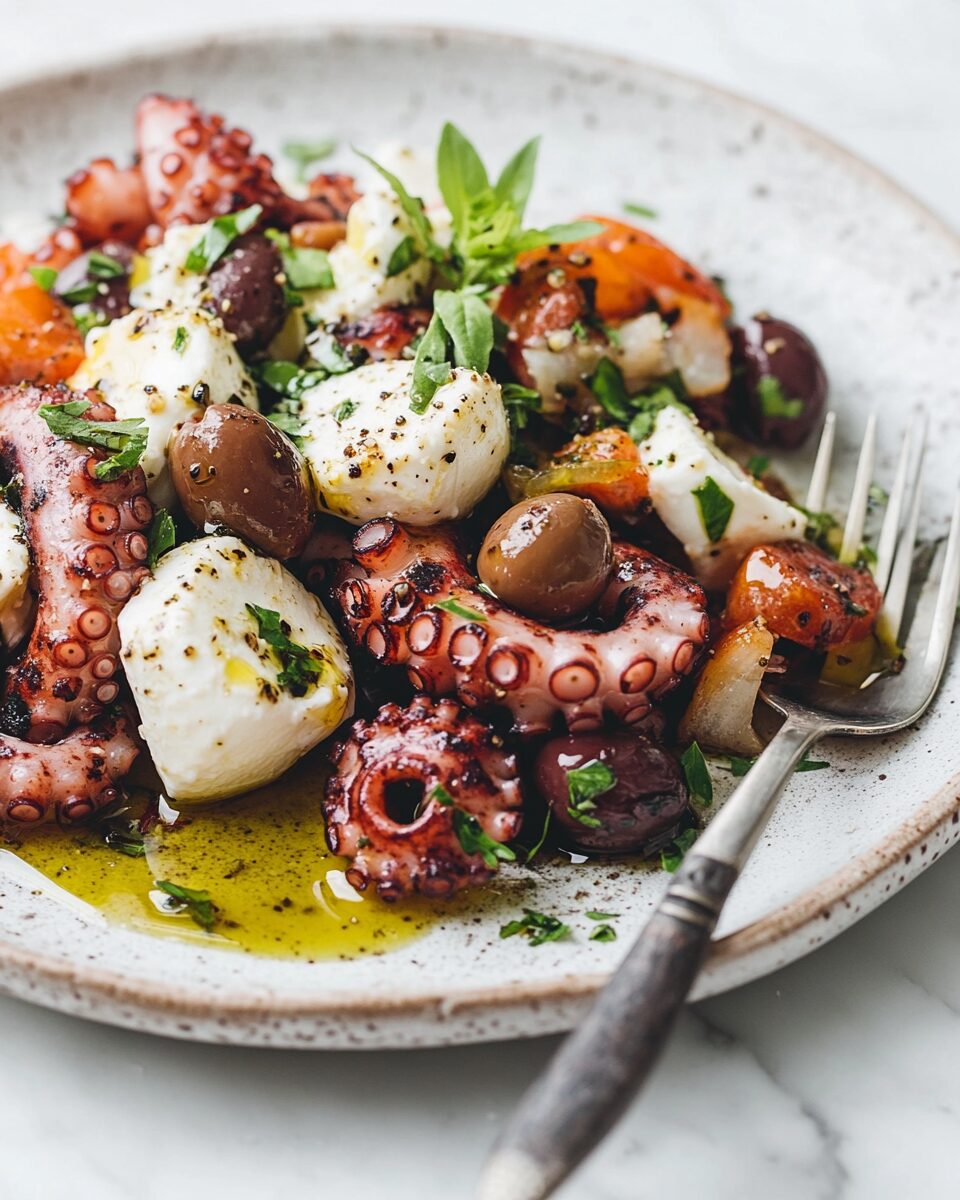Octopus Salad is a delightful recipe, perfect as a cold appetizer, light lunch, or dinner. This dish is fresh, beautifully seasoned with olive oil, and prepared entirely from scratch, ensuring a delicious and wholesome experience.
Full Recipe:
Ingredients
- 1 fresh octopus
- 2 bay leaves
- 1 onion, finely diced
- 1 garlic clove, finely diced
- 1 chili, finely diced
- 1 lemon, zested and juiced
- 4 lemon wedges
- 2 tablespoons olive oil
- Salt and pepper, to taste
- Handful of fresh parsley, chopped
- 10 olives, halved
- Peppercorns
Directions
- Fill a large pot halfway with water and bring it to a boil over high heat.
- Using metal tongs, dip the octopus into the boiling water for 5 seconds, lift it out, and repeat this process three times.
- Submerge the octopus in the boiling water and add bay leaves, peppercorns, onion, and lemon wedges. Cover with a lid and simmer for 45–60 minutes, depending on the octopus’s size. The octopus is done when a fork can easily pierce the meat.
- Allow the octopus to cool completely by leaving it in the cooking water for at least 2 hours or overnight.
- Using tongs, transfer the octopus to a large bowl. Peel the octopus and cut it into smaller slices.
- Prepare the remaining ingredients: halve the olives, finely dice the onion, garlic, and chili, and chop the parsley. Add everything to the bowl with the octopus.
- For the dressing, mix olive oil, lemon juice, and lemon zest in a small bowl. Season with salt and pepper.
- Pour the dressing over the octopus mixture, stir to combine, and serve immediately.
Nutritional Value (per serving)
- Calories: 200–250 kcal
- Protein: 25–30 g
- Fat: 8–12 g (mostly healthy fats from olive oil)
- Carbohydrates: 4–6 g
- Fiber: 1–2 g
- Cholesterol: 80–100 mg
- Sodium: 400–500 mg
- Vitamin B12: 20–25% of the daily value (DV)
- Iron: 10–15% of the DV
- Omega-3 Fatty Acids: 500–800 mg
The Origin of Octopus Salad
Octopus Salad has its roots in Mediterranean cuisine, where seafood plays a central role in daily meals. Countries like Italy, Spain, and Greece have long traditions of preparing octopus as a staple ingredient in salads and stews. The use of olive oil, lemon, and fresh herbs is a hallmark of this culinary heritage, emphasizing fresh and simple ingredients that allow the natural flavors to shine.
This dish reflects the Mediterranean lifestyle—a balance of health, flavor, and connection to the sea. By preparing Octopus Salad at home, you’re embracing a piece of this rich culinary tradition.
What Makes Octopus Salad Special?
- Unique Texture and Flavor: Octopus has a delicate, slightly chewy texture that’s unlike any other seafood. When cooked correctly, it becomes tender and flavorful, absorbing the dressing and seasonings beautifully.
- Nutritional Benefits: Octopus is low in fat and high in protein, making it a healthy choice for those looking to maintain a balanced diet. It’s also rich in essential nutrients like vitamin B12, iron, and omega-3 fatty acids.
- Customizable Ingredients: The salad can be adapted to include additional ingredients like cherry tomatoes, capers, or cucumber for extra flavor and crunch.
- Impressive Presentation: The vibrant colors of the salad, from the deep hues of the octopus to the green parsley and black olives, make it visually appealing and perfect for entertaining guests.
Tips for Preparing Octopus
- Choosing Fresh Octopus: Look for octopus that’s fresh, with a firm texture and a clean, oceanic smell. If fresh octopus isn’t available, frozen octopus is an excellent alternative as it’s often pre-tenderized.
- Tenderizing the Octopus: Dipping the octopus into boiling water multiple times helps the skin stay intact during cooking and ensures even tenderness. For additional tenderness, some cooks use methods like pounding the octopus or freezing it before cooking.
- Cooking Time: The key to perfectly tender octopus is slow cooking. Simmering it in seasoned water for 45–60 minutes allows the collagen to break down, resulting in a melt-in-your-mouth texture.
- Cooling in Cooking Liquid: Letting the octopus cool in its cooking liquid is essential for retaining its natural flavors and achieving a tender texture.
Serving Suggestions
Octopus Salad is versatile and can be served in a variety of ways:
- As a Starter: Serve it chilled on a bed of mixed greens with a slice of crusty bread to begin a Mediterranean-themed meal.
- As a Main Dish: Pair it with a side of warm, buttery potatoes or a refreshing couscous salad for a complete and hearty meal.
- In a Wrap: Use the salad as a filling for pita bread or tortillas for a light and portable lunch option.
- Plated Elegantly: Arrange the octopus slices neatly on a platter with lemon wedges and a drizzle of extra virgin olive oil for a show-stopping presentation.
Health Benefits of Octopus Salad
- High in Protein: Octopus is an excellent source of lean protein, essential for muscle repair and growth.
- Rich in Omega-3 Fatty Acids: These healthy fats support heart health, reduce inflammation, and promote brain function.
- Packed with Vitamins and Minerals: Octopus provides a good amount of vitamin B12, iron, and selenium, all of which are crucial for energy production and immune system support.
- Low in Calories: With only about 200–250 calories per serving, this salad is a light yet satisfying meal option.
- Antioxidant-Rich: The addition of olive oil, parsley, and garlic contributes antioxidants, which help combat oxidative stress and support overall health.
Why You Should Try This Recipe
Octopus Salad is more than just a dish; it’s an experience. The process of preparing octopus from scratch allows you to connect with the ingredients and appreciate the effort that goes into creating a flavorful meal. The end result is a dish that’s light, refreshing, and packed with Mediterranean flavors.
This recipe is ideal for seafood enthusiasts looking to try something new or for anyone wanting to add a healthy and sophisticated option to their menu. It’s also a great conversation starter at dinner parties, showcasing your culinary skills and knowledge of global cuisine.
Conclusion
Octopus Salad is a dish that beautifully combines simplicity and sophistication. Its roots in Mediterranean cuisine give it a timeless appeal, while its nutritional benefits make it a modern favorite. The tender octopus, seasoned with olive oil, lemon, and fresh herbs, creates a balance of flavors that’s both refreshing and satisfying.
By trying this recipe, you’re not only enjoying a delicious meal but also embracing a culinary tradition that celebrates fresh ingredients and bold flavors. Whether served as an appetizer, main course, or a creative addition to wraps and sandwiches, Octopus Salad is sure to impress and delight anyone who tastes it.






